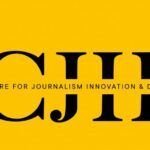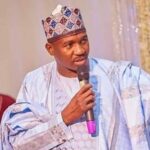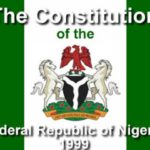Nigerians across the country on this day 27 year ago trooped out to vote for the presidential candidates of their choice, after many years of military rule.
The election conducted by the National Electoral Commission of Nigeria (NECON) under the chairmanship of Professor Humphrey Nwosu had two contenders for the presidency, Moshood Kashimawo Olawale Abiola of the Social Democratic Party (SDP) and Bashir Tofa of the National Republican Convention (NRC).
- What MKO Abiola had hoped to achieve as president – Son
- ‘We must keep asking IBB why he annulled June 12’
Unofficial result of the election, not declared by the electoral umpire, indicated a victory for late Abiola, who reportedly polled 8,341,309 votes against Tofa’s 5,952,087.
The annulment of the poll by President Ibrahim Babangida extended the military reign in the country until May 29,1999.
Local and international observers adjudged the election as credible, transparent and free.
Twenty-seven years after, echoes from the poll still reverberate the country’s political space, thus the declaration of June 12, as Democracy Day by President Muhammadu Buhari, jettisoning the previous date, May 29.
The foundation for civilian rule was laid on February 27, 1999, when the country held a presidential poll.
The Independent National Electoral Commission (INEC), chaired by Ephraim Akpata conducted it.
Chief Olusegun Obasanjo of the PDP who had just returned from prison polled 18,738,154 votes to defeat Chief Olu Falae, who contested on a joint Alliance for Democracy-All People’s Party (AD-APP) ticket.
Falae polled 11,110,287 votes.
Months after the poll, General Abubakar Abdulsalami handed over to the winner on May 29,1999, a date set aside for the celebration of Democracy until this administration changed it.
On April 29, 2003, INEC conducted its second presidential election.
Abel Guobadia, who was the second chairman of INEC, supervised the poll.
Despite the hiccups, incumbent Obasanjo coasted to victory with 24,456,140 votes.
His closest opponent Muhammadu Buhari of the All Nigeria People’s Party (ANPP) polled 12,710,022 votes.
Buhari was followed by late Chukwuemeka Odumegwu Ojukwu of the All Progressives Grand Alliance (APGA) who came third with 1,297,445 votes.
Other candidates who contested the presidential election included Jim Nwobodo, United Nigeria People’s Party; late Gani Fawehinmi, National Conscience Party; Sarah Jubril, Progressive Action Congress; Ike Nwachukwu, National Democratic Party and Chris Okotie, Justice Party, among others.
First civilian to civilian transition
On May 29,2007, the country witnessed the first civilian to civilian transition of power after late Umaru Musa Yar’adua won the controversial April 21 presidential election.
Election observers from the European Union described the election as “the worst they had ever seen anywhere in the world”, with “rampant vote rigging, violence, theft of ballot boxes and intimidation.”
Shortly after he was sworn in, Yar’adua set in machinery for the reform of the country’s electoral system, after admitting to the fact that the poll that brought him into power was flawed.
Yar’adua polled 24,638,063 votes, Buhari of the ANPP polled 6,605,299, Atiku Abubakar of AC 2,637,848 votes; Orji Uzor Kalu (PPA) 608,803; Attahiru Bafarawa (DPP) 289,224 and Odumegwu Ojukwu (APGA) 155,947.
Prof. Maurice Iwu who was the third chairman of INEC conducted the election.
Another presidential election was held in the country on April 16, 2011, with the candidate of the PDP Goodluck Ebele Jonathan retaining the seat.
He polled 22,495,187 votes, Buhari of CPC got 12,214,853; Nuhu Ribadu (ACN) garnered 2,079,151 and Ibrahim Shekarau (ANPP) scored 917,012 votes in the election conducted by Prof. Attahiru Jega, a former Vice-Chancellor of Bayero University, Kano.
The 2015 presidential election was first scheduled for February 14, 2015.
However, INEC postponed it by six weeks to March 28, mainly due to the poor distribution of Permanent Voter Cards (PVCs), and also to curb ongoing Boko Haram insurgency in the northeast.
The poll marked the end of the 16 years reign of the PDP (1999-2015) as candidate of the then opposition, All Progressives Congress (APC), Buhari won with 15,424,921 votes, to beat the sitting president, then Jonathan of the PDP, who scored 12,853,162 votes.
Prof. Attahiru Jega, also conducted the election, making him the only INEC chairman, who has conducted two general elections so far.
Last year’s presidential election which held on 23 February 2019, saw Buhari retaining his seat.
It was initially scheduled for February 16, but INEC postponed it by a week at 03:00am on the original polling day, citing logistical challenges in getting electoral materials to polling stations.
Buhari polled 15,191,847 votes and his main contender, Atiku Abubakar, garnered 11,262,978 in the election conducted by Prof. Mahmood Yakubu.
It’s mixed-blessing – Political scientists
Political scientists shared different views on the progress made by Nigeria in the conduct of credible elections from 1993 to date.
If these views are anything to go by, then the conduct of elections in Nigeria can be described as both mixed-bag and mixed-blessing.
Professor Rauf Ayoade Dunmoye of the Department of Political Science and International Studies of the Ahmadu Bello University (ABU), Zaria, for example, believes that Nigeria has recorded progress in the way elections are conducted in the country.
He said credible elections are not achieved in “one day”. Countries make mistakes during their democratic practices and make amendments.
The foregoing, according to him, makes the election a continuous process.
“Remember, Nigeria experienced many years of military rule.
“Therefore, we were used to the marshal approach of the military.
“This approach almost became systemic and it impacted on the way we conduct elections.
“We have been practicing democracy for about 21 years and within this period we were able to conduct different elections, being election a major determinant of democratic rule.
“Because of the foregoing and many other reasons, I think we have made progress, though we are not yet where we supposed to be.”
He said for elections to become more credible in Nigeria, the number of political parties has to be reduced drastically, while the electoral reforms that the country started should continue.
He added: “For me, the major factor that hinders the progress of our elections in Nigeria is the political parties.
“The parties are so indiscipline that they cannot adhere to their manifestos and constitutions.
“At the federal level, for example, what the president says is final.
“At the state level, the governors have the parties in their pockets’’.
To strengthen elections in Nigeria, according to Professor Dunmoye, political parties should be above every member irrespective of his position.
“The judiciary should ensure quick dispensation of justice.
“Both the ruling and the opposition parties should respect the choices of the electorate.
“Any party that loses elections should effectively play the role of the opposition.
“A situation where party members begin to decamp to other parties, because they have lost an election is what is bringing win-at-all-cost syndrome and vote-buying,” Professor Dunmoye said.
However, for Dr Ahmed Buba, Head, Department of Political Science of the Kaduna State University (KASU), there has been no progress in the way elections are conducted in Nigeria.
He identified many problems that are hindering the smooth conduct of elections in Nigeria to include bad governance, attitude of politicians, interference in the independence of the Independent National Electoral Commission (INEC) and what he called the indiscipline of security agencies during elections.
Dr Buba said: “You see, the major challenge to our elections has to do with those in power.
“There is this syndrome of winning elections at all cost.
“Those in power do everything to ensure that they either return to office or their preferred candidate does.
“This brings about rampant malpractices where security agents are used.
“Therefore, there is serious indiscipline on the part of our security agencies.
“Instead of them to be defending the system, they end up defending regimes and individuals.”
He said another major challenge to elections in Nigeria is the issues of INEC’s independence.
“According to him, INEC is only independent in theory.
He added: “There is serious interference in the way INEC and other electoral umpires before it operated.
“Pressure from politicians, especially those in power, makes them to change their rules and regulations sometimes in the midst of elections.
“Therefore, this makes them not truly independent and it affects the credibility of the different elections we have had in Nigeria.
“Another problem has to do with the judiciary.
“They often give contradictory judgments.
“This was why many judgments were reversed after they were delivered.
“This usually makes nonsense of the whole process.”
Dr. Buba explained that for Nigeria to get her elections right, the electoral umpire has to be allowed to do its work without interference.
INEC, according to him, should be given adequate funding for early preparation and execution of the electoral processes.
“He said Nigeria is used to what he called fire brigade approach, which is seriously effecting the credibility of elections in Nigeria.
For his part, a political strategy and communication consultant, Dr. Abbati Bako, said the 1993 presidential election was the second free, fair, credible and acceptable election after the elections of 1959, a year before Nigeria’s independence in 1960.
Assessing the conduct of elections in the country from 1993 to date, he said the elections of 2015 were free, fair, credible and acceptable compared to that of 2003, 2007 and 2011.
“Election is one of the key elements of democracy and an institutional technology of democracy.
“But to date the electoral system in Nigeria is still lagging behind compared to other emerging democracies such as Namibia, S/Africa, Ghana and Senegal.
“The world electoral system is now moving into electronic and computerized elections system and Nigeria must be ready for that before the 2023 general elections’’, he said.
He called for a reduction in the number of political parties, saying, “more voting centers should be created and the number of political parties be trimmed to five or seven.
“This will sanitise the system and more emphasis should be given to voter education’’.

 Join Daily Trust WhatsApp Community For Quick Access To News and Happenings Around You.
Join Daily Trust WhatsApp Community For Quick Access To News and Happenings Around You.

